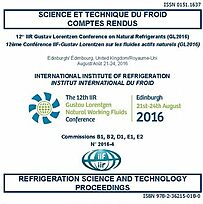
IIR document
Risk assessment of R22 air conditioners using R290.
Number: pap. 1004
Author(s) : COLBOURNE D., SUEN K. O., HUEHREN R.
Summary
Under the Montreal Protocol, Article 5 countries are proceeding with the phase-out of HCFC R22. One of the most prevalent uses of R22 is in split and window type air conditioners. Because R290 has similar saturated pressure-temperature characteristics and volumetric refrigerating capacity as R22, is miscible with the oils typically used in R22 compressors, is relatively cheap and is reported to yield favourable efficiency, it is often deemed as a desirable option to use in existing R22 systems. However, due to the concerns over charging a flammable refrigerant into systems that have been designed for non-flammable refrigerants, entities such as the Executive Committee of the Montreal Protocol and associated implementing agencies warn against such practices. This study addresses the flammability risk associated with applying R290 in converted R22 air conditioners and compares the risk against equivalent air conditioners that are specifically designed and built for R290. Different levels of conversion are considered in terms of the extent of modification that a technician may apply to the R22 air conditioner, ranging from no changes (“drop-in”) to comprehensive alterations in order to bring the equipment as close as possible in line with standardised design requirements.
Available documents
Format PDF
Pages: 10 p.
Available
Public price
20 €
Member price*
Free
* Best rate depending on membership category (see the detailed benefits of individual and corporate memberships).
Details
- Original title: Risk assessment of R22 air conditioners using R290.
- Record ID : 30019012
- Languages: English
- Source: 12th IIR Gustav Lorentzen Conference on Natural Refrigerants (GL2016). Proceedings. Édimbourg, United Kingdom, August 21st-24th 2016.
- Publication date: 2016/08/21
- DOI: http://dx.doi.org/10.18462/iir.gl.2016.1004
Links
- See translations: Evaluación de riesgos de los acondicionadores de aire R22 usando R290.
See other articles from the proceedings (140)
See the conference proceedings
Indexing
-
Themes:
Comfort air conditioning;
Hydrocarbons - Keywords: Safety; Air conditioner; R290; Hydrocarbon; Retrofitting; Refrigerant
-
Study on risk assessment of air conditioner usi...
- Author(s) : BABA A., TAKAICHI K., TAIRA S., et al.
- Date : 2019/08/24
- Languages : English
- Source: Proceedings of the 25th IIR International Congress of Refrigeration: Montréal , Canada, August 24-30, 2019.
- Formats : PDF
View record
-
The first 60,000 HC-290 split air conditioners ...
- Author(s) : RAJADHYAKSHA D., WADIA B. J., COLBOURNE D.
- Date : 2014/08/02
- Languages : English
- Source: 11th IIR Gustav Lorentzen Conference on Natural Refrigerants (GL2014). Proceedings. Hangzhou, China, August 31-September 2, 2014.
- Formats : PDF
View record
-
Ignition sources at the stage of usage for mini...
- Author(s) : TAMURA K., TAKAICHI K., TAIRA S., BABA A., ITAKURA S., MORI H., MAKINO H.
- Date : 2020/12/07
- Languages : English
- Source: 14th IIR-Gustav Lorentzen Conference on Natural Refrigerants (GL2020). Proceedings. Kyoto, Japon, December 7-9th 2020.
- Formats : PDF
View record
-
Hydrocarbon refrigerant for building air condit...
- Author(s) : YATIM A., ALHAMID M., PAMITRAN A., et al.
- Date : 2019/08/24
- Languages : English
- Source: Proceedings of the 25th IIR International Congress of Refrigeration: Montréal , Canada, August 24-30, 2019.
- Formats : PDF
View record
-
A3 Refrigerant R290 Leak and Ignition Testing f...
- Author(s) : WANG H., HUNTER G.
- Date : 2021/08/31
- Languages : English
- Source: 13th IEA Heat Pump Conference 2021: Heat Pumps – Mission for the Green World. Conference proceedings [full papers]
- Formats : PDF
View record
